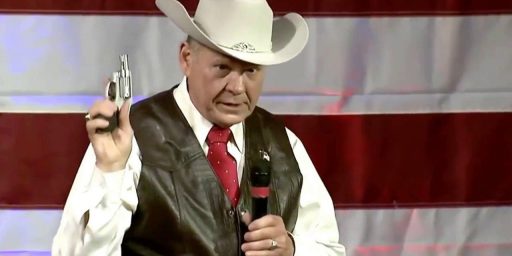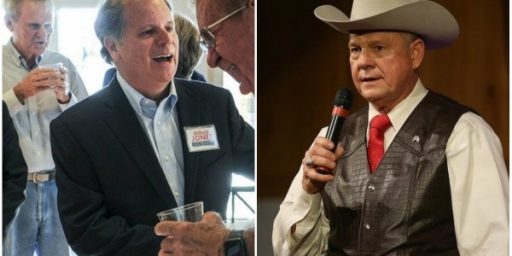Hitchens on Kerry on Veterans
Christopher Hitchens finds John Kerry’s selective reverence for the opinions of veterans somewhat confusing.
It’s obviously ridiculous for either side to accuse the other of using their recollections for “partisan” purposes. What else? Kerry himself didn’t make a fetish of this until he sought a party’s nomination (which is what “partisan” means) and his nemesis John O’Neill has been silent since the last time this all came up, which was in the Nixon era. Did Kerry imagine that if he dressed up in his old uniform again, his former critics would decide to keep quiet? What, if anything, was he thinking?
On that previous occasion, though, Kerry was using his service as a warrior to acquire credentials as an antiwarrior. Now, he is cashing in the same credentials to propose himself as alliance-builder and commander in chief. This is not a distinction without a difference.
Quite so. Claims of “partisanship” are almost always laughable. Of course Kerry’s harshest and most vocal critics are those who don’t plan to vote for him. If a group of Democrats came out against Kerry, it would be surprising. Indeed, on occasions where they have (see Zell Miller), they are immediately denounced as not being “real” Democrats. QED: No one is permitted to oppose Kerry’s election.
John Kerry actually claims to have shot a fleeing Viet Cong soldier from the riverbank, something that I personally would have kept very quiet about. He used to claim that he was a witness to, and almost a participant in, much worse than that. So what if he has been telling the absolute truth all along? In what sense, in other words, does his participation in a shameful war qualify him to be president of the United States? This was a combat of more than 30 years ago, fought with a largely drafted army using indiscriminate tactics and weaponry against a deep-rooted and long-running domestic insurgency. (Agent Orange, for example, was employed to destroy the vegetation in the Mekong Delta and make life easier for the Swift boats.) The experience of having fought in such a war is absolutely useless to any American today and has no bearing on any thinkable fight in which the United States could now become engaged. Thus, only the “character” issues involved are of any weight, and these are extremely difficult and subjective matters. If Kerry doesn’t like people disputing his own version of his own gallantry, then it was highly incautious of him to have made it the centerpiece of his appeal.
Meanwhile, even odder things are happening to Kerry’s “left.” Michael Moore, whose film Kerry’s people have drawn upon in making cracks about the president and the My Pet Goat moment, repeatedly says that you can’t comment on the Iraq war—or at least not in favor of it—if you haven’t shown a willingness to send a son to die there. Comes the question—what if you haven’t got a son of military age? Comes the next question—should it only be veterans or potential veterans who have a voice in these matters? If so, then what’s so bad about American Legion types calling Kerry a traitor to his country?
Indeed, Moore –and Kerry himself, quite often– are employing an odd variant of the chickenhawk ad hominem. It’s especially rich for Moore, who despite his lack of military pedigree certainly seems to have strong opinions about warfighting. As a veteran myself, I find the concept mindboggling in its stupidity. We have an all-volunteer force. The vast majority of the population does not volunteer. A substantial portion would not be fit to serve and would be rejected had they attempted to volunteer. And, while we could arguably use a few more “boots on the ground” in Iraq, the force is pretty much filled to its Congressionally mandated maximum size. We would certainly disenfranchise an incredibly large sector of the public were Moore’s position taken seriously.
Kerry, meanwhile, is in a rather awkward position. Many a Democrat of his age vehemently opposed the Vietnam War. Indeed, until quite recently, so did John Kerry. Watching a Democratic Convention in which Vietnam service was lauded as a virtual prerequisite was, to say the least, rather surreal. Hearing Bill Clinton praise it as a qualification for office was, well, something for which only William F. Buckley, Jr. might know a word.
Steven Taylor has more thoughts on the subject.


